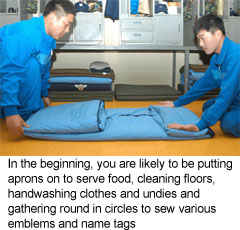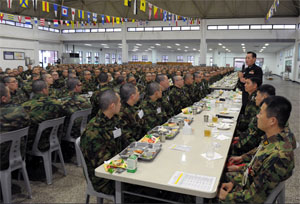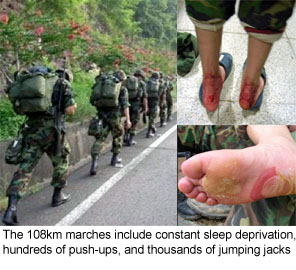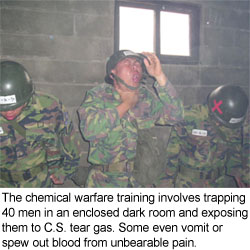 Football and the military, two things that guys love discussing and girls loathe hearing. Anecdotes about playing football in the military will arouse enthusiastic response from male peers andfrom female ones. Military Service.The Army.The Navy.The Marines.The Airforce. Fathom the significance of the grueling 2-3 years every able-bodied Korean man has to endure and you might be more understanding when men can't help but tell story after story about it. Anxiously, therefore, I ask you to bear with me, and the essays that will be solely devoted to this subject. This time, I'll be talking about Basic Training.
Football and the military, two things that guys love discussing and girls loathe hearing. Anecdotes about playing football in the military will arouse enthusiastic response from male peers andfrom female ones. Military Service.The Army.The Navy.The Marines.The Airforce. Fathom the significance of the grueling 2-3 years every able-bodied Korean man has to endure and you might be more understanding when men can't help but tell story after story about it. Anxiously, therefore, I ask you to bear with me, and the essays that will be solely devoted to this subject. This time, I'll be talking about Basic Training.
 Basic training marks the initiation of military service. Its purpose is to transform fragile civilians into courageous,combat-ready, honorable warriors fully prepared for the inevitable hardships of military service. Soundsrather physical and masculine? What happens in the beginning, however, isrefreshingly emotional and effeminate. During the initial hazing period, if you're not being subjected to spontaneous screaming or forced to do various strenuous physical activities, you arelikely tobe putting aprons on to serve food, washing the dishes, cleaning windows and floors, handwashing clothes and undies and gathering round in circles to sew various emblems and name tags. Moreover, the trainees become compulsive criers, as any mention of home, family and loved ones will induce endless streams of tears. Even the usually sentimentally stunted men learn to embrace their inner feelings and spill their hearts out into sincerehandwritten letters.
Basic training marks the initiation of military service. Its purpose is to transform fragile civilians into courageous,combat-ready, honorable warriors fully prepared for the inevitable hardships of military service. Soundsrather physical and masculine? What happens in the beginning, however, isrefreshingly emotional and effeminate. During the initial hazing period, if you're not being subjected to spontaneous screaming or forced to do various strenuous physical activities, you arelikely tobe putting aprons on to serve food, washing the dishes, cleaning windows and floors, handwashing clothes and undies and gathering round in circles to sew various emblems and name tags. Moreover, the trainees become compulsive criers, as any mention of home, family and loved ones will induce endless streams of tears. Even the usually sentimentally stunted men learn to embrace their inner feelings and spill their hearts out into sincerehandwritten letters.
The rules of the outside world don't apply in the military. Age is a vital part of the hierarchy of Korean society; being senior in itself is supposed to demand an inherent respect. In the military, rank supersedes everything. Without any sense of wrongdoing, 20-year old instructors will cause men who are up to 10 years older than them to tremble in fear by making life an intolerable living hell. Time no longer runs ata regular pace as a day is frustratingly long, while a month is surprisingly short. It will cruelly fly past when you're having any sort of break, especially when you're sleeping. It will virtually stop whenever anykind of pain is being inflicted, which is pretty much all the time. Everybody becomes equal. We all start at rock bottom,stripped of our names, wealth, social status and all kinds of freedom.
 Appreciation of freedom. Probably the biggest lesson of basic training. The military is composed of six hundred thousand men who have sacrificed their own freedom to protect the freedom of the nation. The vast majority of people take this freedom for granted, but its importance becomes alarmingly clear once it is snatched away from you. Freedom ofmovement is gone once you've stepped ontothe base. Your right to privacy becomes void the moment you start sharing a wall-less room with a dozen other guys. You eat, drink, sleep and excrete only when they let you. You're forbidden from smiling, laughing and chatting, which you hardly feel like doing anyway. Surprisingly, human beings are remarkably apt at adapting to altered environments and sooner or later the lack of basic human living conditions becomes bearable. Although there are just somethings you can't get used to.
Appreciation of freedom. Probably the biggest lesson of basic training. The military is composed of six hundred thousand men who have sacrificed their own freedom to protect the freedom of the nation. The vast majority of people take this freedom for granted, but its importance becomes alarmingly clear once it is snatched away from you. Freedom ofmovement is gone once you've stepped ontothe base. Your right to privacy becomes void the moment you start sharing a wall-less room with a dozen other guys. You eat, drink, sleep and excrete only when they let you. You're forbidden from smiling, laughing and chatting, which you hardly feel like doing anyway. Surprisingly, human beings are remarkably apt at adapting to altered environments and sooner or later the lack of basic human living conditions becomes bearable. Although there are just somethings you can't get used to.
 The 108km marches, the constant sleep deprivation , the hundreds of push-ups, thousands of jumping jacks, the week-long fasting, and the double 4-hour sessions of extremely intense physical activity are all painstakingly strenuous times, yet they are all mountains that you can conquer –albeit needing great determination and effort.
The 108km marches, the constant sleep deprivation , the hundreds of push-ups, thousands of jumping jacks, the week-long fasting, and the double 4-hour sessions of extremely intense physical activity are all painstakingly strenuous times, yet they are all mountains that you can conquer –albeit needing great determination and effort.
There is one part of Basic Training when trainees are helplessly on the receiving end of a one-sided ravaging -- the gas chamber. Technically called chemical, biological and radiological warfare training, it involves trapping 40 men in an enclosed dark room and exposing them to C.S. tear gas.
 As a given, the excruciating experience forces the victim to excrete liquid from every orifice of your body while the lungs feel as if they're eroding away.
Some even vomit or spew out blood. Others resort to hitting themselves or others in a futile attempt to divert their attention away from the unbearable pain. Complete despair in utter chaos, only made worse by the fact that there is not a single thing you can do to make things even a little bit better except to pray that the instructor opens the door. Once that door is finally open, you realize that clean air is the sweetest and most refreshing thing in the world.
As a given, the excruciating experience forces the victim to excrete liquid from every orifice of your body while the lungs feel as if they're eroding away.
Some even vomit or spew out blood. Others resort to hitting themselves or others in a futile attempt to divert their attention away from the unbearable pain. Complete despair in utter chaos, only made worse by the fact that there is not a single thing you can do to make things even a little bit better except to pray that the instructor opens the door. Once that door is finally open, you realize that clean air is the sweetest and most refreshing thing in the world.
It's not all bad. I guess it may be worth experiencing once in your life. The physical state of your body will never be better. You can't smoke, drink or eat sugary or salty foods. The skinny bulkup, the chubby lose weight. You gain the confidence to overcome any obstacle in life, with the affirming knowledge that you survived this ordeal. It is also a great opportunity to meet a variety of people from outside your normally secluded circle, mine being SNU and the city of Seoul. It is quite astonishing when you become acquainted with people from different backgrounds. You form camaraderie with fellow trainees, forging a close bond with those with whom you've suffered together.
The harsher the hardship, the stronger the solidarity. Once it's over, there is a sensational sense of achievement and relief. The horrifying part though, is that your military life has just begun.
Written by YU Minseok, SNU English Editor, brits@snu.ac.kr ?
Reviewed by Eli Park Sorensen, SNU Professor of Liberal Studies
Proofread by Brett Johnson, SNU English Editor

